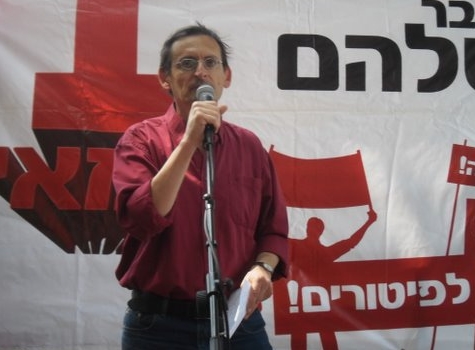
Israel was hit by a general strike on Monday that closed hospitals, banks, ports, universities, public transports and the country’s main international airport. The decision to let the strike go ahead on a limited basis from 6:00 am was taken by the National Labor Court which debated the issue through the night following the collapse of talks between the Histadrut (Federation of Labor in Israel) and the neo-liberal finance ministry.

MK Dov Khenin during the May Day rally in Tel-Aviv, 2011 (photo: Al Ittihad)
The strike, which shut down all government offices, ports, post offices and the Tel Aviv stock exchange for most of the morning, centres on the working conditions of hundreds of thousands of contract workers employed by the government and the private sector. It had been due to continue indefinitely.
After an all-night hearing, the National Labor Court finally issued a temporary order at 6 a.m. Monday morning restricting the general strike planned for Monday to just four hours. In ruling to restrict the strike to four hours on Monday, Judge Nili Arad said that the conflict behind the strike “was complex and required more time for negotiations”.
The Finance Ministry, Federation of Israeli Chambers of Commerce, Federation of Israeli Economic Organizations and Union of Local Authorities all sought injunctions against the strike, which the Histadrut labor federation declared late last week.
The Histadrut wants more than hundreds of thousands cleaners, guards and maintenance staff servicing as contract workers to be moved into direct employment. The Finance Ministry officials say they support “improving the salaries and work conditions of contract workers”, but the Histadrut says this is not enough. Prime Minister Binyamin Netanyahu on Sunday morning pleaded for the Histadrut to cancel the strike.
One the Communist Party of Israel leading member, MK Dov Khenin expressed support for the strike, saying: “The struggle for the rights of contract workers is one of the most important facing Israeli society. The open-ended strike is intended to protest the second class status of hundreds of thousands of Israelis working in the public sector and some private companies”.
“The use of these workers, who do not benefit from the same social rights and are underpaid, has become a veritable capitalist exploitation epidemic to which we must put a stop,” he added.


